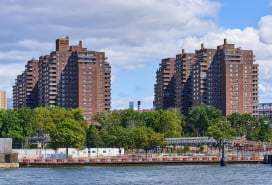NYC Renovation Questions: Can I move a gas line?

Q. I want to expand my kitchen into my dining room but there's a gas line in the way that's connected to my gas meter. Can I move it or do I have to work around it?
A. It sounds like what you're referring to is actually a gas riser, which begins in the basement of your building and terminates at the top floor. Getting authorization from your co-op or condo board to move it is probably not possible.
“If you alter a gas riser, you have to shut down the riser in the basement,” says construction professional Mike Kaler. This shutdown affects everyone whose appliances receive gas from that particular riser.
“Any piping that is maintained or repaired must be brought up to the new Con Ed specifications such as installing riser valves, meter bars and replacing any defective piping,” says Joe Santullo of Systems 2000 Plumbing in Manhattan.
As you can imagine, this takes time and doesn’t come cheap.
Then, before the gas can be turned back on, an integrity test must be performed.
The Department of Buildings administers a pressure test to make sure there are no leaks. If it passes, a “gas authorization is obtained and a separate test is then performed with Con Ed before gas is turned on and restored,” says Santullo.
If the riser fails the test--which happens often--you more than likely have a leak between the basement and your apartment, and Con Ed won’t restore gas until the leak is located and fixed. If the leak is in a main riser, no apartment connected to that riser will have gas until the problem is resolved.
This could go on for a few weeks or longer. As a result, you would quickly become the most unpopular shareholder and have a slew of unhappy neighbors with no gas in their apartments.
This is also a complete nightmare for your board--hence, their reluctance to approve this sort of thing.
Bear in mind that a gas riser is different than a gas branch line.
A gas branch line usually supplies a stove or an appliance, and a gas riser supplies several stoves or appliances usually within one apartment line in a high-rise, says Santullo. Most often, if your apartment’s gas supply comes from a main riser in the basement, you’ll have a gas meter behind a cabinet in your kitchen.
Unlike gas risers, gas lines can often be moved, as it should only affect the apartment under renovation.
Tracy Kaler was a designer, decorator and renovator in her last life. Before working as a freelance writer, she held several furniture sales jobs in the Big Apple and purchased a new wardrobe. Now she works in her pajamas and commutes two feet to her desk each day. This is one of the few advantages of living in a New York apartment, and well, so much for that wardrobe.
See all NYC Renovation Questions
Related posts:
NYC Renovation Questions: Where to turn when something goes wrong after the contractor leaves
NYC Renovation Questions: Getting that punch list completed (without coming to blows)
10 first-time renovation mistakes even New Yorkers make
Here's why you may be overpaying for your NYC renovation
How to put a washer-dryer in your NYC co-op (or condo)
5 things you may live to regret doing in your own apartment

























